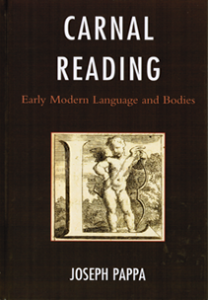
The question of an erotic readership has always vexed scholars. With little evidence of anyone’s actually reading erotic material, scholars have had to make do with variations of an “ideal reader” approach. Insofar as it presupposes authorial intention and a stable meaning, this theoretical model proves unsatisfactory. Using an interdisciplinary approach, Carnal Reading: Early Modern Language and Bodies proposes a new theory of erotic reading that refigures bodily responses as constitutive of cognitive understanding. In its content and style, erotic writing was perceived to interact physically with the reader’s body—or more specifically, the sensitive soul via the imagination. “Lively” descriptions infused desires that could permanently affect not only the entire “animal economy,” or constitution, but also a person’s reasoning faculties. All good writing was meant to move the passions, but there was no way to determine whether the “warmth” derived from reading was erotic or otherwise.
Chapter 1, “‘Thoughts Swelled with Carnosity’: Imagination, Enthusiasm, and Love,” briefly rehearses Adrian John’s account of how religious reading can inspire enthusiasm in readers. This understanding of how religious reading inflames the imagination applies equally well to amorous discourses. “The Passions: Music, ‘Infusion,’ and Teen-Age Reading Habits” (chapter 2) examines early modern conduct books and discourses about music to illustrate the notion of the early modern body as “permeable” and, as such, impressionable to all forms of stimulating media. The chapter offers a close reading of Manley’s New Atalantis to demonstrate how reading habits could transform a young person’s constitution. Chapter 3, “The Physiological Aesthetics of Erotic Response: Intention, Style, Association,” focuses on contemporary literary critiques that privilege “lively” depictions and the consequences that style has on authorial intention. The final chapter, “Sexy Rhetoric: Nice Figures, or Books that Do It ‘the old Grammar rule way,’” explores the potential eroticism immanent in language. The overall picture is of a reading body continually at odds with its susceptibility to language.
About the Author
Joseph Pappa teaches courses on British literature at Binghamton University.

